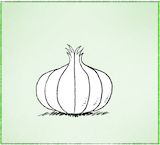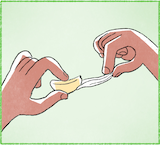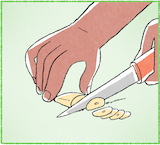


อันนี้คืออี่หยัง อันนี้เป็นกะเทียม
กะเทียมหัวหนึ่ง
กะเทียมนี้มันเป็นอี่หยัง มันกะเป็นพืดอย่างหนึ่งเนาะ เป็นแนวปุง ปุงอาหาน ให้มันมีลดซาด หลือว่าให้มันมีกิ่นอีกแบบหนึ่ง แล้วแต่คนมัก บางคนกะบ่มัก บางคนกะมักเนาะ มันสิมีลดแซบๆ เผ็ดๆ จักหน่อยหนึ่งเนาะ กะเทียมเนี้ย เอาไปไว้ไปปุงแนวกินเนาะ
ในกะเทียมหัวหนึ่งเนี้ย มันกะสิมีแย้กออกไป เป็นกีบๆ เนาะ
ในหัวหนึ่งกะสิมีหลายกีบ ลังอันกะมีเจ็ด แปดกีบ ลังอันกะเป็นสิบกีบ
แล้วเฮากะเอาไปปุงอาหาน บางเที่ยกะใส่เป็น ใส่เที่ยละกีบ สองกีบ สามกีบกะได้ บางเที่ยกะใส่แต่ละหัวกะได้ ขั้นปะลิมานแนวกินมันหลายเนาะ
แล้วอันขาวๆ อยู่ขอบๆ มันเนี้ยเป็นอี่หยัง อันนี้อาดสิเป็นแบบว่า เป็นเปียกมันกะได้ หลือว่าเป็น บ่แน่ใจ กะอาดสิเป็นเปียกมัน
แต่ว่าอันขาวๆ เนี้ยกินบ่ได้เนาะ ก่อนเฮาสิเฮ็ดแนวกิน เฮากะต้องแกะออกก่อน แกะเปียกมันให้แกะอันสีขาวๆ คาบมันเนี้ย แกะออกก่อน แล้วเฮากะใส่อันข้างในมันที่มันเป็นเนี้ยเหลียงๆ หลือว่าเป็นในมันหละเนาะ แล้วกะไปปุงแนวกิน
12
เขากำลังเฮ็ดหญัง กะมีคนคนหนึ่ง เขากำลังแกะ แกะเปียก หลือว่าแกะคาบกะเทียมเนาะ
เป็นหญังเขาต้องแกะเปียกมันออก หลือว่าแกะอันขาวๆ นั้นออก เพื่อว่าอันนั้นมันกินบ่ได้ กะต้องแกะออก หลือว่ามัน เขาบ่พากันกินเนาะ เขากะเลยแกะออกไป แล้วกะสิใส่แต่ในมัน หลือว่าน่วยอันที่มันเป็นกีบเหลียงๆ นั้น เอาไปกินส่ำนั้นเนาะ
13
เขากำลังเฮ็ดหญัง กะเขากำลังหั่นกะเทียมเนาะ หั่นกะเทียมเป็นซิ้นน้อยๆ เป็นซิ้นน้อยๆ
เขากะเอามากีบเดียว เอามากีบเดียว แล้วกะหั่นๆๆๆๆ ให้มันเป็นซิ้นน้อยๆ
เขาอาดสิบ่อยากตำ บางคนกะเอาไปตำกะได้ บางคนกะเอามาหั่น มาสับๆๆๆ กะได้ แล้วแต่สิ่งที่เขาถะหนัด หลือว่าสิ่งที่เขาต้องกาน ที่สิเอาไปเฮ็ดเนาะ
Link to overview page
Link to dictionary
| Isaan | Pronunciation | Tones | Thai | English/Notes |
|---|---|---|---|---|
| อัน | an | M | อัน | 1. thing, object 2. general clf. for objects |
| นี้ | ni: | HF | นี้ | 1. this 2. here |
| คือ | khʉ: | HR | คือ | 1. to be, to resemble, like, as 2. why {บักหล้าคือบ่เก็บโต่ะแน่ = [addressing a young boy] Why haven't you cleared the table?} |
| อี่หยัง | i:-yaŋ | H-M | อะไร | 1. what {นี้คืออี่หยัง = What is this?} {มื้อนี้เจ้าเฮ็ดอี่หยัง = What are you doing today?} {กินเข้างายกับอี่หยัง = What did you have for breakfast?} 2. something, anything, (in negations) nothing {บ่ต้องเฮ็ดอี่หยังอีกเลยนอกจากใส่ปุย = [we] don't need to do anything besides adding fertilizer} |
| เป็น | pen | M | เป็น | 1. to be, to exist 2. to be able to 3. to suffer, sth. happens to 4. เป็นหญัง[...]คือ in initial position: why? {เป็นหญังเขากะคือแปงฟัน = Why is he brushing his teeth?} {เป็นหญังเคี่ยงบินมันคือสิตก = Why is the airplane falling down?} |
| กะเทียม | ga-thi:am | M-HR | กระเทียม | garlic |
| หัว | hu:a | M | หัว | 1. head 2. clf. for onions, bulbs of garlic |
| หนึ่ง | nʉŋ | H | หนึ่ง | 1. one 2. after adjective: intensifier {บักคักหนึ่ง = very much} {อันบักใหญ่หนึ่ง = very large}, or attenuates the meaning {กะดาดมันแผ่นน้อยๆ หนึ่ง = the piece of paper is [relatively] small} |
| มัน | man | HR | มัน | it (also used to refer to people) |
| กะ | ga | M | ก็ | 1. then, consequently 2. also |
| พืด | phʉ:t | HF | พืด | plant |
| อย่าง | ya:ŋ | H | อย่าง | type, kind, sort, category |
| เนาะ | nɔ | H | เนาะ | final particle: makes the statement softer, looking for agreement |
| แนว | nɛ:o | HR | 1. kind, sort, type 2. method, mode of action - and the corresponding tool or object, thing {แนวนุ่งห่ม = clothes, clothing} {แนวคม = sharp object [e.g., a pair of scissors]} {แนวถือ = handle} 3. clf. for words starting with แนว {กินแนวอันนั้น = กินแนวกินอันนั้น = to eat this food [which was talked about earlier]} |
|
| ปุง | puŋ | M | ปรุง | to season, to flavor, to cook, to mix, to combine {ปุงกาแฟ = to season coffee, i.e., to add sugar} {ปุงกวยเตียว = to season noodle soup (e.g., with chili, fish sauce, vinegar, sugar etc.)} |
| อาหาน | a:-ha:n | M-M | อาหาร | food {ญุงมันกินเลียดเป็นอาหาน = the mosquito feeds on blood} |
| ให้ | hai | LF | ให้ | 1. to give {หมอกำลังเอายาให้คนป่วยกิน = the doctor is giving the patient medicine} 2. for 3. to allow, to be allowed |
| มี | mi: | HR | มี | 1. to have 2. there is |
| ลดซาด | lot-sa:t | H-HF | รสชาติ | taste Notes: pronunciation: also realized as ลดชาด |
| หลือ | lʉ: | M | หรือ | or |
| ว่า | wa: | H | ว่า | 1. that, as {คำว่า X = the word X} 2. to say |
| กิ่น | gin | H | กลิ่น | smell, scent, odour {ดมกิ่น, ได้กิ่น = to smell} |
| อีก | i:k | LF | อีก | 1. more, again 2. other, another |
| แบบ | bɛ:p | LF | แบบ | 1. example, model, kind 2. style, form, pattern, design |
| แล้วแต่ | lɛ:o-tɛ: | HF-H | แล้วแต่ | up to, depending on |
| คน | khon | HR | คน | person, people |
| มัก | mak | H | ชอบ | to like, to love, to want, to desire |
| บาง | ba:ŋ | M | บาง | 1. some {สัดบางโตบ่มีขา = some animals don't have legs} {บางคนสิมักกินกวยเตียวแทนเข้า = some people like to eat noodle soup instead of rice (dishes)} {บางสิ่งบางอย่าง = something, anything} 2. thin |
| บ่ | bɔ: | H | ไม่ | 1. no, not 2. question particle, transforming a statement into a question Notes: spelling exception in line with common usage on social media |
| สิ | si | M | จะ | future tense auxiliary {เขากำลังสิตื่น = he's about to wake up} {สิไปตะหลาด = [I'm] going to the market} |
| ลด | lot | H | รส | taste |
| แซบ | sɛ:p | HF | อร่อย | 1. food: tasty {กวยเตียวมันแซบบ่ = Is the noodle soup tasty?} 2. sleep: well {เป็นตานอนแซบคัก = it looks as if she's sleeping very well} |
| เผ็ด | phet | M | เผ็ด | spicy, hot |
| จัก | jak | M | จัก | 1. answer to a question: [I] don't know, don't know exactly, [I'm] not sure {พุซายคนนี้เขาเถ้าไป่ จัก จักเถ้าหลือบ่เถ้า เบิ่งบ่ค่อยออก = Is this man here already old? I don't know. I can't see clearly whether he's old or not.} {เขาเว้ากันอยู่ใส จักคือกัน = Where are they talking? I don't know either.} 2. exact(ly), what exactly {จักต้มอี่หยังกะบ่ฮู้ = I don't know what (exactly) he is cooking} {บ่ลู้คือกันจักปาอี่หยัง = I don't know either what kind of fish this is} 3. how much/many? {ต้นไม้มีจักต้น = How many trees are there?} {ตอนนี้จักโมงแล้ว = What time is it now?} {มือของเฮานี้สิมีจักนิ้ว = How many fingers do our hands have?} 4. a bit, a little bit {จักหน่อย/จักหน่อยหนึ่ง = a bit, a little bit} |
| หน่อยหนึ่ง | nɔ:i-nʉŋ | H-H | นิดหน่อย | a bit, a little bit, not much Notes: see also หน่อยเดียว |
| เนี้ย | ni:a | HF | เนี้ย | variant of นี้ = this, here |
| เอา | ao | M | เอา | to take, to give {เขากำลังเอาก่องไปซั่ง = he's taking the boxes to weigh them} {หมอกำลังเอายาให้คนป่วยกิน = the doctor is giving medicine to the patient} {เอาไว้ถ้า = is for, is used for, has the purpose of} |
| ไป | pai | M | ไป | 1. to go 2. auxiliary indicating action extending into the future |
| ไว้ | wai | HF | ไว้ | 1. to keep, to put, to place, to retain, to save, to reserve {เขาเอาหัวของเขาไว้ใส = Where does she put her head?} {หมาสิเลี้ยงไว้บ้าน = dogs are kept/raised in the house} {ไก่เลี้ยงไว้ในคอก = chicken are kept/raised in a coop} {หน้ามันบังไว้ = the face is covered/not visible} {เขาเอาโทละสับวางไว้หู = he holds the phone to his ear} 2. for {นาลิกาปุกมีไว้เฮ็ดหญัง = What is an alarm clock for?} {หม้อเอาไว้เฮ็ดแนวกิน = a pot is used to make food} {ก่องเอาไว้เฮ็ดหญัง ก่องเอาไว้ใส่ของ = What is the box for? It's for putting in stuff.} Notes: see also ไว้ถ้า |
| แนวกิน | nɛ:o-gin | HR-M | อาหาร | food {เฮ็ดแนวกิน = to prepare food} {ตำบักหุ่งเนี้ยกะสิเป็นแนวกิน = papaya salad is (a kind of) food} |
| ใน | nai | HR | ใน | in, within |
| แย้ก | yɛ:k | HF | แยก | to separate, to split |
| ออก | ɔ:k | LF | ออก | 1. to go out, to leave 2. out |
| กีบ | gi:p | LF | กลีบ | clove (of garlic) {กะเทียมหัวหนึ่งสิมีปะมานสิบกีบ = one bulb of garlic has about ten cloves} |
| หลาย | la:i | M | เยอะ, มาก | many, much, very |
| ลัง | laŋ | HR | บาง | some {ควยลังโตกะบ่มีเขา ควยลังโตกะมีเขา = some buffaloes don't have horns, some have horns} {ลังเที่ย = sometimes} |
| เจ็ด | jet | M | เจ็ด | seven |
| แปด | pɛ:t | LF | แปด | eight |
| สิบ | sip | M | สิบ | ten |
| แล้ว | lɛ:o | HF | แล้ว | 1. finished 2. already 3. and then, and next (especially แล้วกะ) 4. auxiliary for past tense |
| เฮา | hao | HR | เรา | 1. personal pronoun: we 2. personal pronoun: I |
| เที่ย | thi:a | H | ครั้ง, เที่ยว | clf. for times, rounds {บางเที่ย = sometimes} |
| ใส่ | sai | H | ใส่ | 1. to put something in/on {เขาใส่บักพิกในกวยเตียวหลาย = he's putting a lot of chili in his noodle soup} {เขาบีบยาสีฟันใส่แปงสีฟัน = he squeezes toothpaste on the toothbrush} {ก่องเอาไว้ใส่ของ = boxes are there to put stuff in} 2. to wear (clothes) {เขาใส่เสี้ยแขนญาว = he's wearing a long-sleeve} 3. directed at {เอิ้นใส่กัน = to call each other/to say to each other} {หมามันเห่าใส่แมว = the dog barks at the cat} {ล้องเพงใส่ไม = to sing into the microphone} {เขากำลังซี้มือไปใส่พุซาย = she's pointing at the man} |
| ละ | la | H | ละ | each, per, every |
| สอง | sɔ:ŋ | M | สอง | two |
| สาม | sa:m | M | สาม | three |
| ได้ | dai | HF | ได้ | 1. can 2. to get, to obtain 3. before verb: indicating past tense 4. บ่ได้ + verb: not |
| แต่ละ | tɛ:-la | H-H | แต่ละ | each {มือแต่ละข้างกะสิมีห้านิ้ว = each hand has five fingers} {แต่ละมื้อๆ = each day} |
| ขั้น | khan | LF | เมื่อ | when, if |
| ปะลิมาน | pa-li-ma:n | M-H-HR | ปริมาณ | quantity, amount, volume |
| ขาว | kha:o | M | ขาว | white |
| อยู่ | yu: | H | อยู่ | 1. to be (located) at 2. yet, still 3. auxiliary indicating continuous or progressive action {ทอดปาอยู่ในกะทะ = (in the process of) frying a fish in the pan} {แม่กำลังเมี้ยนเฮียนอยู่ = mother is cleaning/tidying up the house} |
| ขอบ | khɔ:p | LF | ขอบ | edge, border |
| อาด | a:t | LF | อาจ | 1. might, may, will 2. likely |
| เปียก | pi:ak | LF | เปลือก | shell, peel, outer skin Notes: pronunciation: also realized as เปือก |
| แน่ใจ | nɛ:-jai | H-M | แน่ใจ | to be sure, confident, certain |
| แต่ว่า | tɛ:-wa: | H-H | แต่ว่า | 1. but 2. only {ฮู้แต่ว่าเขายืนอยู่พุเดียว = I only know that he's standing there by himself} |
| กิน | gin | M | กิน | to eat, to consume, to use |
| ก่อน | gɔ:n | H | ก่อน | 1. before 2. first, first of all |
| เฮ็ด | het | H | ทำ | to do, to make |
| ต้อง | tɔŋ | HF | ต้อง | to have to, must |
| แกะ | gɛ | M | แกะ | 1. to unpack, to unwrap 2. to remove, to take out 3. to peel |
| สี | si: | M | สี | 1. color 2. colored pencil, crayon |
| คาบ | kha:p | HF | คราบ | crust, skin, cast-off skin |
| ข้างใน | kha:ŋ-nai | LF-HR | ข้างใน | inside |
| ที่ | thi: | H | ที่ | 1. that, which {คนที่ยืนอยู่ฝั่งขวา = the person which is standing on the right = the person standing on the right} {เว้าคำที่บ่สุพาบ = to speak words which are impolite = to speak impolitely} 2. for ordinal numbers {ที่สาม = third} |
| เนี้ย | ni:a | HF | เนื้อ | meat Notes: pronunciation: also realized as เนื้อ |
| เหลียง | li:aŋ | M | เหลือง | yellow |
| ใน | nai | HR | เมล็ด | seed or stone of a fruit |
| หละ | la | M | แหละ, ล่ะ | 1. auxiliary for emphasis at the end of a phrase 2. auxiliary to create a follow-up question: And what about ... ? {แล้วลดคันที่สองหละ = And what about the second car?} |
| เขา | khao | M | เขา | personal pronoun: he, she |
| กำลัง | gam-laŋ | M-HR | กำลัง | auxiliary indicating continuous or progressive action |
| หญัง | ɲaŋ | M | อะไร, เป็นหญัง = ทำไม | 1. what {เขากำลังเฮ็ดหญัง = What is he doing?} {ธูปเอาไว้เฮ็ดหญัง = What are incense sticks for?} 2. something, anything, (nothing) 3. เป็นหญัง[...]คือ in initial position: why {เป็นหญังเขาคือใส่บักพิกลงไปในกวยเตียว = Why is he putting chili in [his] noodle soup?} {เป็นหญังหน้าต่างมันคือเปิด = Why is the window open?} {เป็นหญังมันคือมีควนไฟ = Why is there smoke?} |
| นั้น | nan | HF | นั้น | that, there |
| เพื่อ | phʉ:a | H | เพื่อ | for Notes: the vowel เอือ is likely to be a Thai loan; pronunciation: also realized as เพี่ย |
| พา | pha: | HR | พา | 1. to guide, to lead, to accompany {หมา: พามันไปเหล้น = dog: [I] took/brought him to play} 2. plural marker for verbs, to be doing sth. together {เขาพากันใส่ส้ง = they are all wearing trousers} {เขากำลังพากันเฮ็ดหญัง เขากำลังพากันส้างบ้านส้างเฮียน = What are they doing? They're building a house.} |
| กัน | gan | M | กัน | mutual, each other, with another, together {เขากำลังนั่งเว้ากัน = they're sitting and talking} {เขาสองคนฮักกัน = they love each other} {ปาสองโตนี้ ใหญ่ห่างกันหลายบ่ = These two fish here, are they very different in size (from each other)?} {ต่างกัน = to be different (from each other)} {ก่องอันไหนหนักกว่ากัน = Which box is heavier (than the other(s))?} |
| เลย | lə:i | HR | เลย | 1. futher on, beyond, past {เข็มน้อยเลยเลขสิบสองไป = the minute hand has passed number twelve} 2. too much 3. at all 4. definitively 5. completely, utterly |
| แต่ | tɛ: | H | แต่ | 1. but {แต่บ่ต่างกันหลาย = but not very different} {แต่บ่ลู้ว่าเขาญ่างมาแต่ใส = but [I] don't know where he's coming from, see also: แต่ว่า} 2. only {ตอนนี้มีแต่ขี้ฝ้า = now there are only clouds} |
| น่วย | nu:ai | H | ลูก, ผล | clf. for the fruits (e.g., banana, coconut, lime, papaya, watermelon), vegetables (e.g., chilis), eggs, mountains, the sun |
| ส่ำนั้น | sam-nan | H-HF | แค่นั้น | 1. just that, only that 2. that much |
| หั่น | han | H | หั่น | to cut, to slice |
| ซิ้น | sin | HF | ชิ้น | 1. piece, slice 2. skin {หนีบซิ้น = to pinch the skin} |
| น้อย | nɔ:i | HF | น้อย | 1. few, little 2. small |
| มา | ma: | HR | มา | 1. to come 2. auxiliary expressing action towards the present or focal time {กะคุเฮ็ดมาจากอี่หยัง = What is the bucket made of?} {แล้วเขากะเก็บเงินจากพุนั้นมา = and then she takes the money of that person} |
| เดียว | di:ao | M | เดียว | only, alone, single |
| อยาก | ya:k | LF | อยาก | to want, to wish |
| ตำ | tam | M | ตำ | 1. to hit 2. to bump into 3. chili, garlic etc.: to pound |
| สับ | sap | M | สับ | to chop, cut, hack |
| สิ่ง | siŋ | H | สิ่ง | thing, object |
| ถะหนัด | tha-nat | M-M | ถนัด | 1. to be expert in/at, to be skilled in/at, to be strong in 2. to be dexterous |
| ต้องกาน | tɔŋ-ga:n | HF-M | ต้องการ | to need, require, desire, wish, demand |